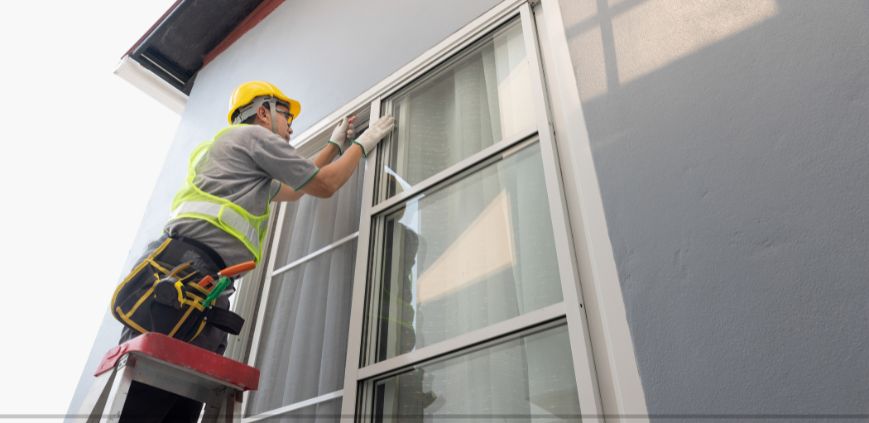What to Know About Window and Door Replacement
Window and door replacement is a significant investment that can enhance your home's comfort, energy efficiency and curb appeal. However, knowing when to replace them and finding a reputable company to do the job can be challenging. This guide will help you determine if you need new windows and doors, how to choose a trustworthy contractor and what to look for in terms of price, insurance and warranties. Be sure to check out the resources below.
How to Determine if You Need New Windows and Doors
Several signs indicate that it might be time to replace your windows and doors. Understanding these indicators can save you money in the long run and improve your home’s overall functionality.
- Drafts and air leaks: If you notice drafts near your windows or doors, it’s a clear sign that they are no longer sealing properly. This can lead to increased energy bills as your heating and cooling systems work harder to maintain a comfortable temperature.
- Difficulty in operation: Windows and doors should open and close smoothly. If you struggle to operate them or notice that they stick, it might be due to warping, rust or other damage that has compromised their functionality.
- Condensation between glass panes: If you see condensation forming between the panes of double or triple-glazed windows, it’s a sign that the seal is broken. This not only reduces the window’s insulating properties but can also lead to mold growth.
- Visible damage or decay: Physical damage such as cracks, warping or rotting wood are clear indicators that replacement is necessary. Damaged windows and doors not only look unsightly but also compromise your home's security and energy efficiency.
- Increased noise levels: If you’ve noticed more noise from outside, your windows and doors may not be providing adequate soundproofing. This can be particularly bothersome in urban areas or neighborhoods with heavy traffic.
- High energy bills: A sudden spike in your energy bills could be due to inefficient windows and doors. Older models may not have the insulation properties of modern versions. This can lead to heat loss in the winter and heat gain in the summer.
- Outdated style: Sometimes, the decision to replace windows and doors is driven by aesthetics. If your windows and doors look outdated or don’t match the style of your home, replacing them can significantly boost curb appeal.
How to Find a Reputable Company
Once you’ve decided that it’s time to replace your windows and doors, the next step is finding a reputable company to do the work. Here’s how to go about it:
- Research and referrals: Start by asking friends, family or neighbors for recommendations. Word-of-mouth referrals are often reliable because they come from people with firsthand experience. Researching online reviews and ratings can give you insight into the quality of work and customer satisfaction with different companies.
- Check credentials: Ensure the company is licensed and insured. Licensing ensures that the company meets local regulations and standards. Insurance protects you from liability in case of accidents or damages during the project.
- Experience and expertise: Look for companies that specialize in window and door replacement and have several years of experience in the industry. Experienced contractors are more likely to provide high-quality work and handle any unexpected issues that may arise during the project.
- Request quotes: Obtain at least three quotes from different companies. This will give you a good idea of the average cost for your project and help you identify any outliers. Be wary of quotes that seem too good to be true; they often come with hidden costs or subpar materials.
- Ask for references: A reputable company should be able to provide references from previous clients. Contact these references to ask about their experience with the company.
- Review the contract: Before signing any contract, make sure it includes all the details of the project: scope of work, materials to be used, timeline and payment schedule. This ensures that both parties are clear on expectations and reduces the risk of misunderstandings.
What to Look For: Price, Insurance and Warranties
When evaluating different companies and their offerings, consider the following factors:
- Price: While price is an important factor, it shouldn’t be the sole determinant. The cheapest option might not always be the best, as lower prices can sometimes indicate inferior materials or workmanship. Aim for a balance between cost and quality to ensure you get the best value for your money.
- Insurance: Ensure that the company has both liability insurance and workers’ compensation insurance. Liability insurance covers any damages to your property during the project. Workers’ compensation will protect you from responsibility if a worker is injured on your property.
- Warranties: A good warranty is a sign of a company’s confidence in its work. Look for warranties that cover both materials and labor. Typically, you should expect a warranty of at least ten years for windows and doors. Read the fine print to understand what is and isn’t covered.
Once you know what to look for you can move forward with your window and door replacement. Remember, doing a bit of research will help you in the long-term!

